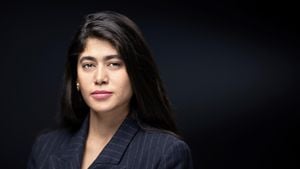Rai 1 has recently premiered its new television miniseries Belcanto, which aims to explore the rich, emotive world of 19th-century Italian opera through the lens of female empowerment. Debuting on February 24, 2025, this ambitious project crafted by director Carmine Elia is set against the dramatic backdrop of Italy's revolutionary mid-century period.
The story revolves around Maria, played by the acclaimed actress Vittoria Puccini, alongside her two daughters, Antonia and Carolina, portrayed by Caterina Ferioli and Adriana Savarese, respectively. Bound by their passion for music, the three women flee their oppressive life in Naples to follow their dreams of becoming opera singers, seeking refuge and opportunity in the city of Milan. This captivating narrative set mediates ideals of freedom, self-discovery, and the struggles of familial loyalty.
Each Monday over the next four weeks, viewers can tune in at 21:30 to experience the heartfelt tales of courage and aspiration as the three women navigate their path through the world of opera. The series is crafted as eight episodes, aiming to capture the audience's attention through both drama and the historical depth it carries.
The series initiates with Maria making the difficult decision to leave her violent husband, Iginio (presented by Antonio Gerardi), and embarking on the tumultuous road filled with unforeseen challenges, with the first episode focused on their daring escape to Milan. The family seeks refuge with Domenico (Carmine Recano) as the narrative progresses, presenting societal contrasts of opportunity and peril, central to the women's experiences.
While the premise of Belcanto offers inventive storytelling potential merging various genres, including period drama and musical elements, critics have noted potential shortcomings. The ambitious blend of historical reconstruction, romantic drama, and musical numbers has yielded mixed reactions. Initial reviews hint at the struggles faced with production qualities, where budget constraints may have impacted costume design and set authenticity. Reviewers highlighted how the show's attempts to portray the opera era may fall short of portraying historical accuracy and emotional connectiveness.
Comments from critics reveal, "Belcanto è una storia di lotta per la libertà, che spinge le protagoniste a sfidare non solo il destino, ma anche loro stesse," addressing the fundamental theme of the series—an exploration of liberatory paths amid societal constraints. Yet, these honest endeavors have led to criticism on performance execution, with some describing acting styles as “theatrical and exaggerated,” diluting the intensity the historical narrative aspires to convey.
While the show boasts an impressive cast—featuring notable faces from the previous acclaimed series Mare Fuori—some believe this “reunion” lacked the adequate portrayal of its rich narrative. Despite the reservations expressed, the elegance and willingness of the cast to tackle these dynamics cannot be disputed. The emotional plight of the three leading women offers palpable engagements, illustrating historical themes of class struggle and individual ambition within the opera culture.
On the production side, filming has spanned across various picturesque Italian locales, enhancing the visual appeal of Belcanto—from Naples to Bergamo to the iconic Teatro Fraschini, which has stood as the focal point of Italy's comprehensive opera scene. This blend of backdrop authenticity entwined with passionate performances adds layers to the dramatic ambiance.
Belcanto remains poised as not just another television series; it touches upon complex issues of cultural representation and the socioeconomic fabric of its historical period. While striving to tackle class struggles and the inner workings of honor among the disadvantaged, the audience is left questioning whether the series successfully grasps and articulates these themes adequately.
To sum up, Belcanto might serve as an ambitious endeavor within the Rai 1 lineup, shedding light on women's historical narratives entwined with art and culture. Whether it achieves its intentions will depend upon audience reception, where the series finds its sustainable footing amid critique and acclaim. This thought-provoking entry heralds the importance of storytelling balance—where time, truth, and tantalizing tales find convergence, leaving viewers eager for the next episode.



